across的用法与易错说明
across的用法

across的用法Across 是一个英语单词,可以作为介词、副词、形容词或动词使用。
以下是两篇关于 "across" 的用法的文章,每篇约3000字:篇一:across 作为介词的用法Across 这个介词在英语中有着多种用法和意义。
它一般表示横穿、跨越、遍布、经过等含义,用来描述人或物从一个地方移动到另一个地方的情况。
首先,across 可以表示从一个地点到达另一个地点。
例如:“我每天骑自行车穿过公园去上班。
”这句话中的"across" 描述了通过公园的路径。
又如:“我父母已经从墨西哥搬到美国。
”这句话中的 "across" 表示从一个国家到另一个国家的搬迁。
其次,across 还表示在一定范围内遍布或分布。
例如:“整个城市都布满了广告牌。
”这句话中的 "across" 描述了广告牌遍布的情况。
又如:“这个公司的分支机构遍布全球。
”这句话中的 "across" 表示公司在全球范围内有分支机构。
另外,across 还可以表示在某个时间点或时间段发生的事件。
例如:“整个夏天,我们都会去海滩度假。
”这句话中的 "across" 表示整个夏天的时间段。
又如:“法国人纪念巴士底狱事件的日子。
”这句话中的 "across" 表示在某个具体的日子。
最后,across 还可以表示相互之间的关系,比如表达交流、合作、对抗等情况。
例如:“我在网上与很多不同国家的人交流。
”这句话中的 "across" 表示通过网络进行交流。
又如:“这两个国家一直在进行谈判。
”这句话中的 "across" 表示两个国家之间的谈判。
总结来说,"across" 是一个多功能的介词,根据不同的语境可以有不同的意义。
它可以表示从一个地点到另一个地点、遍布或分布在一定范围内、在某个时间点或时间段发生的事件,以及相互之间的关系。
across和through的区别
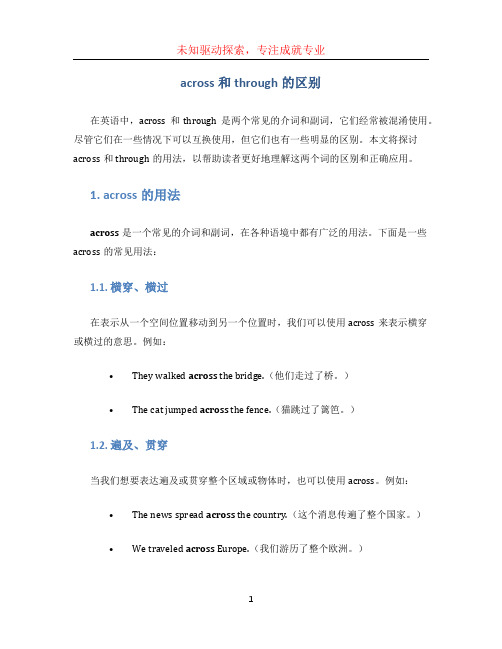
across和through的区别在英语中,across和through是两个常见的介词和副词,它们经常被混淆使用。
尽管它们在一些情况下可以互换使用,但它们也有一些明显的区别。
本文将探讨across和through的用法,以帮助读者更好地理解这两个词的区别和正确应用。
1. across的用法across是一个常见的介词和副词,在各种语境中都有广泛的用法。
下面是一些across的常见用法:1.1. 横穿、横过在表示从一个空间位置移动到另一个位置时,我们可以使用across来表示横穿或横过的意思。
例如:•They walked across the bridge.(他们走过了桥。
)•The cat jumped across the fence.(猫跳过了篱笆。
)1.2. 遍及、贯穿当我们想要表达遍及或贯穿整个区域或物体时,也可以使用across。
例如:•The news spread across the country.(这个消息传遍了整个国家。
)•We traveled across Europe.(我们游历了整个欧洲。
)1.3. 向对面/彼岸across还可以表示朝向对面或彼岸的方向移动。
例如:•She swam across the river.(她游过了江。
)•He shouted across the street.(他在街对面大声喊叫。
)2. through的用法through也是一个常见的介词和副词,具有多种用法。
以下是一些through的常见用法:2.1. 从一边到另一边/穿过与across类似,through也可以表示从一边到另一边或穿过某个空间位置。
例如:•He walked through the door.(他穿过门走了进去。
)•The car crashed through the barrier.(汽车冲破障碍物。
)2.2. 经过、穿过中间当我们想要表达通过中间位置或途径时,可以使用through。
across的用法
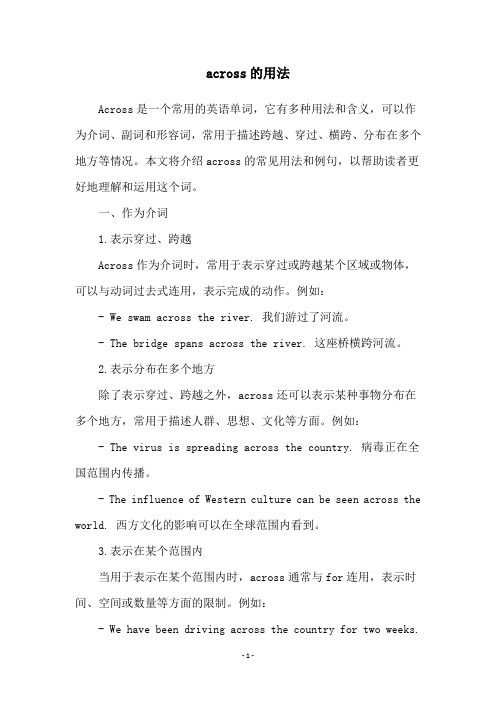
across的用法Across是一个常用的英语单词,它有多种用法和含义,可以作为介词、副词和形容词,常用于描述跨越、穿过、横跨、分布在多个地方等情况。
本文将介绍across的常见用法和例句,以帮助读者更好地理解和运用这个词。
一、作为介词1.表示穿过、跨越Across作为介词时,常用于表示穿过或跨越某个区域或物体,可以与动词过去式连用,表示完成的动作。
例如:- We swam across the river. 我们游过了河流。
- The bridge spans across the river. 这座桥横跨河流。
2.表示分布在多个地方除了表示穿过、跨越之外,across还可以表示某种事物分布在多个地方,常用于描述人群、思想、文化等方面。
例如:- The virus is spreading across the country. 病毒正在全国范围内传播。
- The influence of Western culture can be seen across the world. 西方文化的影响可以在全球范围内看到。
3.表示在某个范围内当用于表示在某个范围内时,across通常与for连用,表示时间、空间或数量等方面的限制。
例如:- We have been driving across the country for two weeks.我们已经开车穿越全国两个星期了。
- We need to distribute the food evenly across the refugees. 我们需要把食品平均分配给难民。
二、作为副词1.表示横穿、斜穿当across作为副词时,通常表示横穿或斜穿某个区域或物体,可以与动词连用,表示进行中的动作。
例如:- The car swerved across the road. 汽车横冲直撞穿过了马路。
- The bird flew across the sky. 鸟儿翱翔穿过天空。
across的用法

across的用法Across是一个非常常见的英语单词,它有多种用法,可以用作介词、副词、形容词和动词。
在本文中,我们将探讨across的不同用法及其用法的例子。
1. 介词作为介词,across表示“横过”、“穿过”、“跨越”等意思。
例如:- The bridge across the river is very old. (横跨河流的桥很老了。
)- We walked across the field to get to the other side. (我们穿过田野到达另一边。
)- The swimmer swam across the lake to reach the other shore. (游泳者横渡湖泊到达另一岸。
)2. 副词作为副词,across表示“跨越”、“横跨”或“横穿”等意思。
例如:- She ran across the street to catch the bus. (她横穿街道去赶公交车。
)- The bird flew across the sky and disappeared from sight. (鸟儿飞越天空,消失在视野中。
)- The musician's fingers ran across the keyboard as he played. (音乐家的手指横跨键盘弹奏。
)3. 形容词作为形容词,across表示“横跨的”或“穿过的”等意思。
例如:- The bridge across the river is closed for repairs. (横跨河流的桥因修缮而关闭。
)- The path across the field is muddy after the rain. (田野上的路径在雨后变得泥泞。
)- The swimmer was exhausted after his long swim across the lake. (游泳者横渡湖泊后很疲惫。
英语中相似词语辨析三:across和cross的区别_写作素材

英语中相似词语辨析三:across和cross 的区别
across,cross
这两个词都是表示横越、渡过之意,在拼写上仅差一字之微,故很易混淆。
它们的区别在于词性和使用场合有所不同。
across是介词;cross是动词。
下面请看例句:
My house is across the harbour,in the vicinity of the Kowloon Park.
我的家在海港的对岸,九龙公园附近。
They live across the Central Plaza.
他们住在中央广场的对面。
Everyone shoutskill it!when a rat is seen to run across the street.
老鼠过街,人人喊打。
He has crossed the border into another territory.
他已越过边界进入别国的领土。
Many steel arch bridges cross the Mississippi in its lower reaches.
在密西西比河的下游许多拱形铁侨横跨河面。
They have crossed over to Japan.
他们已东渡去日本了。
coss除作动词外,亦可作名词。
作名词时,有较强的构词能力,它所构成的词的某些词义和用法是值得注意的。
例如crossroad是交叉路或横马路,而crossroads却是十字路或十字路口,它的前面可以用a,但-s不能丢掉。
如:
The accident took place at a crossroads.。
cross,across与through的区别

cross,across与through的区别《cross,across 与 through 的区别》在英语学习中,cross、across 和 through 这三个词常常让学习者感到困惑,因为它们都与“穿过”“越过”的意思相关,但在使用上却存在着一些微妙的差异。
接下来,让我们详细地探讨一下它们之间的区别。
首先,从词性上来看,cross 既可以是动词,也可以是名词。
作为动词时,它表示“穿过,越过,渡过”等意思。
例如:“He crossed the street carefully”(他小心地穿过了街道。
)作为名词,它有“十字形,十字架”等意思。
across 是一个介词,通常与动词搭配使用,表示“从一边到另一边,横过”。
例如:“The dog ran across the field”(狗跑过了田野。
)through 则是一个介词,强调“穿过,通过(空间、人群、物体等)”。
比如:“The sunlight came through the window”(阳光透过窗户照进来。
)从动作的方向和方式来看,cross 强调在表面上进行的交叉动作,是一个比较直接、短促的动作。
比如说,“cross the road”(过马路),我们可以想象一个人从道路的一边直接走到另一边。
across 则更侧重于表示在一个平面上从一端到另一端的移动,通常是水平方向的。
比如,“swim across the river”(游过这条河),这里强调的是沿着河的宽度方向游过去。
through 所表示的“穿过”,往往涉及从一个空间、物体或人群中间穿过,更加强调在三维空间中的穿行。
例如,“go through the forest”(穿过森林),我们能想象到在森林中行走,周围有树木等障碍物。
再看它们与不同动词的搭配。
常见的与 cross 搭配的动词有:walk cross,run cross 等。
而与 across 搭配的动词有:go across,come across 等。
through和across的用法
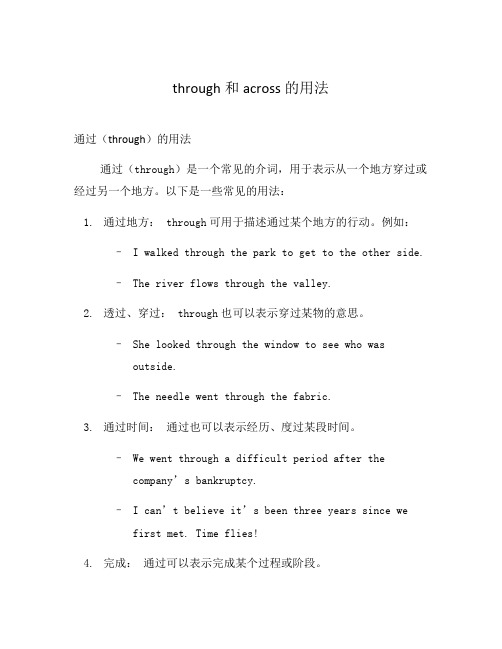
through和across的用法通过(through)的用法通过(through)是一个常见的介词,用于表示从一个地方穿过或经过另一个地方。
以下是一些常见的用法:1.通过地方: through可用于描述通过某个地方的行动。
例如:–I walked through the park to get to the other side.–The river flows through the valley.2.透过、穿过: through也可以表示穿过某物的意思。
–She looked through the window to see who wasoutside.–The needle went through the fabric.3.通过时间:通过也可以表示经历、度过某段时间。
–We went through a difficult period after thecompany’s bankruptcy.–I can’t believe it’s been three years since we first met. Time flies!4.完成:通过可以表示完成某个过程或阶段。
–She finally made it through the audition and got the role.–We need to push through these last few tasks before we can call it a day.横穿(across)的用法横穿(across)是另一个表示穿过或越过某个地点的介词。
以下是一些常见的用法:1.横跨地方: across常用于描述从一边到另一边横穿某个地方。
–We swam across the river to reach the other side.–The bridge extends across the entire valley.2.从一侧到另一侧: across可以表示从一个物体的一侧到另一侧。
across的用法

across的用法across一般有横过;穿过;朝向特定的方向;在对面等意思,那么你知道across的用法吗?下面跟着小编一起来学习一下,希望对大家的学习有所帮助!across的用法:across后常加from,He lives across (the street) from my house.他住在我的房子的对面。
与across不同,through是指在三维空间里移动。
We walked across the ice.I walked through the wood.across用作副词时基本意思是在〔到〕对面。
与静态动词连用多表示位置在对面,与动态动词连用多表示位置向对面从这一边到另一边。
across与数量短语连用,置于单位名词之后,意为宽,表示跨度。
across还可表示状态,意为成十字形交叉状。
across在句中主要用作状语,也可用作表语或宾语补足语。
across不用于比较等级。
across英语例句:1. They stumble across a ghost town inhabited by a rascally gold prospector.他们偶然来到一个居住着一位狡诈的淘金者的废墟之城。
2. She knelt and brushed her lips softly across Michaels cheek.她跪了下来,轻吻迈克尔的脸颊。
3. Lucy had strung a banner across the wall saying Welcome Home Daddy.露西在墙上挂了一条横幅,上面写着欢迎爸爸回家。
4. Nuclear weapons plants across the country are heavily contaminated with toxic wastes.全国的核武器工厂均受到了有毒废弃物的严重污染。
5. Representatives from across the horse industry will attend the meeting.整个赛马业的代表都将参加这次会议。
across的用法及搭配
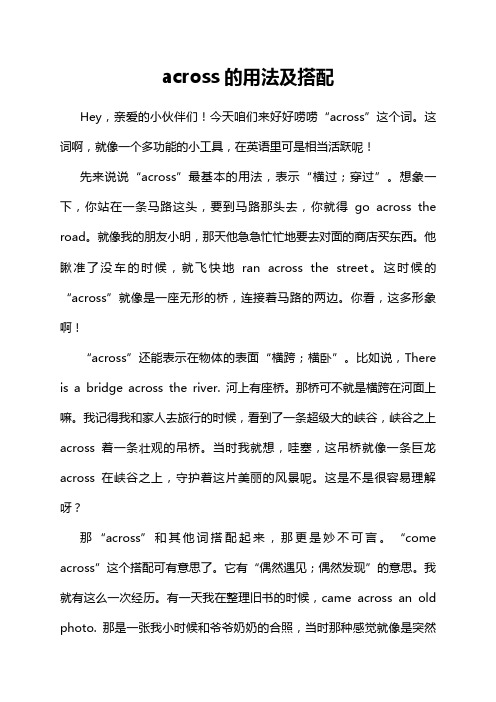
across的用法及搭配Hey,亲爱的小伙伴们!今天咱们来好好唠唠“across”这个词。
这词啊,就像一个多功能的小工具,在英语里可是相当活跃呢!先来说说“across”最基本的用法,表示“横过;穿过”。
想象一下,你站在一条马路这头,要到马路那头去,你就得go across the road。
就像我的朋友小明,那天他急急忙忙地要去对面的商店买东西。
他瞅准了没车的时候,就飞快地ran across the street。
这时候的“across”就像是一座无形的桥,连接着马路的两边。
你看,这多形象啊!“across”还能表示在物体的表面“横跨;横卧”。
比如说,There is a bridge across the river. 河上有座桥。
那桥可不就是横跨在河面上嘛。
我记得我和家人去旅行的时候,看到了一条超级大的峡谷,峡谷之上across着一条壮观的吊桥。
当时我就想,哇塞,这吊桥就像一条巨龙across在峡谷之上,守护着这片美丽的风景呢。
这是不是很容易理解呀?那“across”和其他词搭配起来,那更是妙不可言。
“come across”这个搭配可有意思了。
它有“偶然遇见;偶然发现”的意思。
我就有这么一次经历。
有一天我在整理旧书的时候,came across an old photo. 那是一张我小时候和爷爷奶奶的合照,当时那种感觉就像是突然挖到了宝藏一样惊喜。
你有没有过这样come across一些意外的小惊喜的时刻呢?比如说在逛街的时候,突然come across一家超级酷的小店,里面全是你喜欢的东西。
这感觉就像是命运给你的一个小礼物呢。
“get across”也是个常用的搭配。
它的意思是“使……被理解;把……讲清楚”。
我有个同学叫小红,她特别聪明,但是她在给别人解释数学题的时候,总是很难get her ideas across. 她讲得头头是道,可同学们却听得一头雾水。
她就很苦恼,觉得自己像是在对着一堵墙说话。
单词记忆法 across
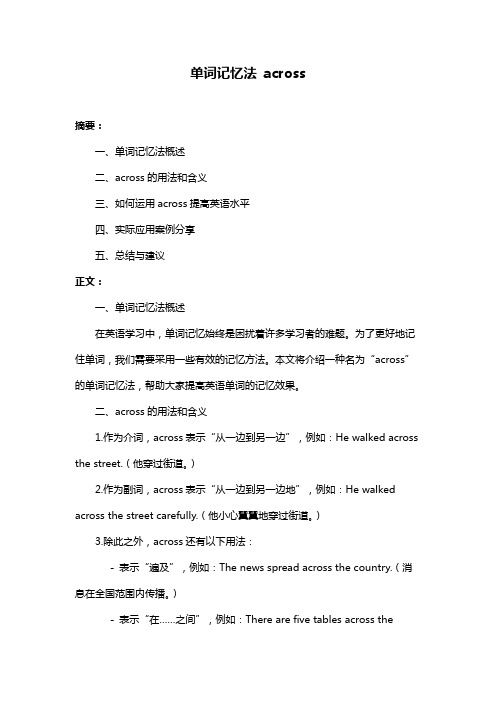
单词记忆法across摘要:一、单词记忆法概述二、across的用法和含义三、如何运用across提高英语水平四、实际应用案例分享五、总结与建议正文:一、单词记忆法概述在英语学习中,单词记忆始终是困扰着许多学习者的难题。
为了更好地记住单词,我们需要采用一些有效的记忆方法。
本文将介绍一种名为“across”的单词记忆法,帮助大家提高英语单词的记忆效果。
二、across的用法和含义1.作为介词,across表示“从一边到另一边”,例如:He walked across the street.(他穿过街道。
)2.作为副词,across表示“从一边到另一边地”,例如:He walked across the street carefully.(他小心翼翼地穿过街道。
)3.除此之外,across还有以下用法:- 表示“遍及”,例如:The news spread across the country.(消息在全国范围内传播。
)- 表示“在……之间”,例如:There are five tables across theroom.(房间里有五张桌子。
)三、如何运用across提高英语水平1.联想记忆法:通过将单词与现实生活中的场景、人物或其他单词联系起来,帮助记忆。
例如,记忆单词“intelligent”(聪明的),可以联想到一位聪明的同学,他的名字叫Tom,那么可以这样记忆:Tom is an intelligent student.2.单词家族法:将单词按照家族进行分类记忆,如动词、名词、形容词等。
例如,以“communicate”(沟通)为核心,可以扩展记忆相关词汇:communication(沟通方式)、communicative(善于沟通的)、communicator(沟通者)等。
3.单词游戏法:通过单词游戏巩固记忆,如单词接龙、拼写比赛等。
可以和朋友或家人一起进行这些游戏,提高学习趣味性。
4.实践运用法:在实际生活中运用所学单词,如写作、口语交流等。
across短语
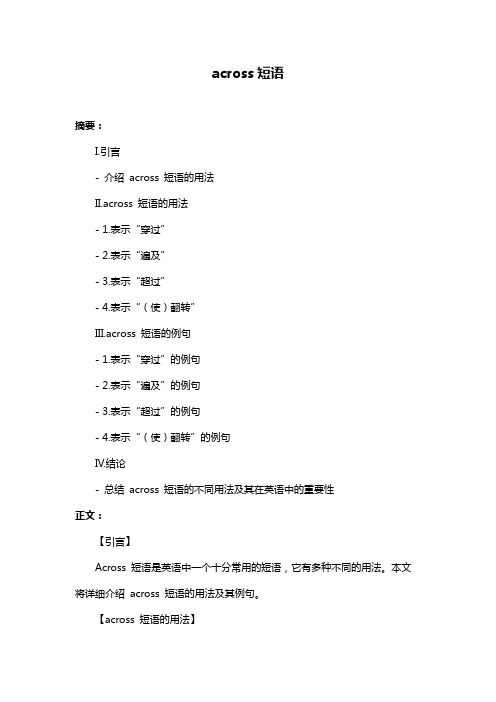
across短语摘要:I.引言- 介绍across 短语的用法II.across 短语的用法- 1.表示“穿过”- 2.表示“遍及”- 3.表示“超过”- 4.表示“(使)翻转”III.across 短语的例句- 1.表示“穿过”的例句- 2.表示“遍及”的例句- 3.表示“超过”的例句- 4.表示“(使)翻转”的例句IV.结论- 总结across 短语的不同用法及其在英语中的重要性正文:【引言】Across 短语是英语中一个十分常用的短语,它有多种不同的用法。
本文将详细介绍across 短语的用法及其例句。
【across 短语的用法】Across 短语主要有以下四种用法:1.表示“穿过”:指从一个地方经过另一个地方到达第三个地方。
例如:“他穿过公园去上班。
”2.表示“遍及”:指某物或某人在某个范围内遍布。
例如:“这个城市的人口已经超过了100 万。
”3.表示“超过”:指在某方面胜过或优于其他人或物。
例如:“他的成就超过了他的同龄人。
”4.表示“(使)翻转”:指将某物从一种状态变为另一种状态。
例如:“他把书翻到了最后一页。
”【across 短语的例句】以下是一些across 短语的例句:1.表示“穿过”的例句:- She walked across the park to get to the store.(她穿过公园去商店。
)- The river runs across the city.(河流穿城而过。
)2.表示“遍及”的例句:- The news of his success has spread across the country.(他的成功消息已经传遍全国。
)- The internet has revolutionized the way we communicate across the world.(互联网已经改变了我们与世界沟通的方式。
)3.表示“超过”的例句:- His score across the exam was excellent.(他在考试中的总分非常优秀。
中考英语词汇:across用法详解
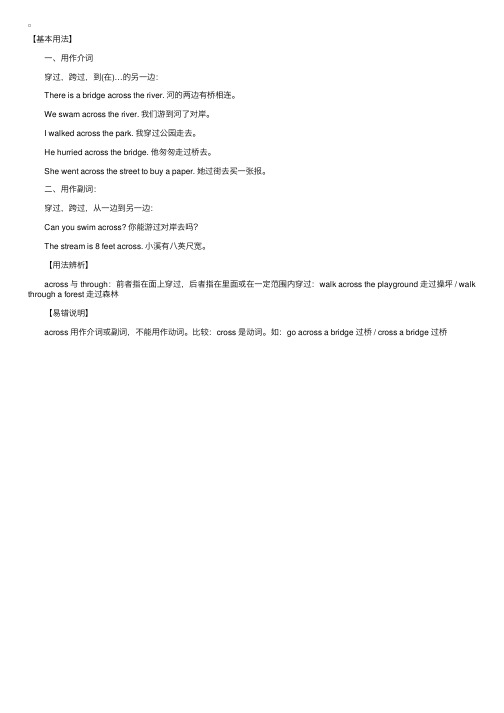
【基本⽤法】
⼀、⽤作介词
穿过,跨过,到(在)…的另⼀边:
There is a bridge across the river. 河的两边有桥相连。
We swam across the river. 我们游到河了对岸。
I walked across the park. 我穿过公园⾛去。
He hurried across the bridge. 他匆匆⾛过桥去。
She went across the street to buy a paper. 她过街去买⼀张报。
⼆、⽤作副词:
穿过,跨过,从⼀边到另⼀边:
Can you swim across? 你能游过对岸去吗?
The stream is 8 feet across. ⼩溪有⼋英尺宽。
【⽤法辨析】
across 与 through:前者指在⾯上穿过,后者指在⾥⾯或在⼀定范围内穿过:walk across the playground ⾛过操坪 / walk through a forest ⾛过森林
【易错说明】
across ⽤作介词或副词,不能⽤作动词。
⽐较:cross 是动词。
如:go across a bridge 过桥 / cross a bridge 过桥。
【初中英语】across的用法与易错说明

【初中英语】across的用法与易错说明
1.用作介词或副词,注意以下用法:
(1)它的意思是“跨越”和“到另一边”。
例如:
icamswimacrosstheriverin10minutes.我可以在十分钟之内游过河去。
(介词用法)
你会说吗?你能在那里游泳吗?(副词用法)
(2)表示静态意义,意为“在……的另一边”。
如:
我家就在街对面。
我家就在街对面。
(介词用法)
weleavedoverattenandweshouldbeacrossinfrancebymidnight.我们十点钟离开多佛,午夜时应能抵达法国那边。
(副词用法)
它可以与介词from连用,意思是“从……的另一边”。
例如:
heshoutedtomefromacrosstheroom.他从房间的另一边向我喊。
(3)它的意思是“交叉”(介词用法)或“从一边到另一边的宽度”(副词用法)。
例如:
hesattherewithhisarmsacrosshischest.他坐在那儿,两臂交叉放在胸前。
(介词用法)
他们是一家人。
这条河有半英里宽。
(副词用法)
2.不要将across误用作动词。
如:
我们不能说:太深了,我们无法穿越
可改为:theriveristoodeepandwecan’tcross.河水太深,我们过不了。
across用法总结
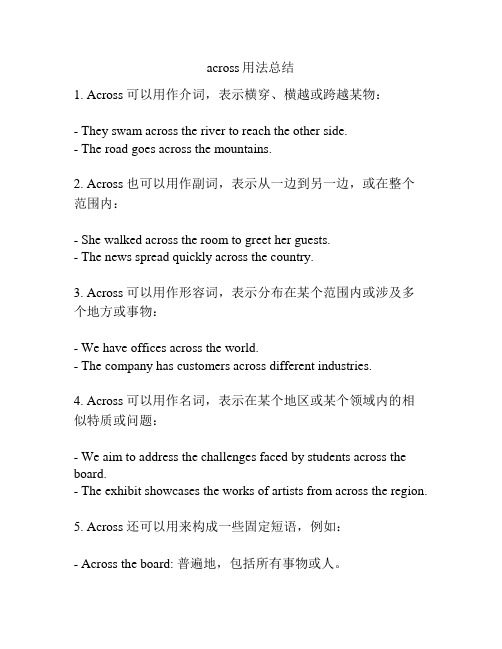
across用法总结1. Across 可以用作介词,表示横穿、横越或跨越某物:- They swam across the river to reach the other side.- The road goes across the mountains.2. Across 也可以用作副词,表示从一边到另一边,或在整个范围内:- She walked across the room to greet her guests.- The news spread quickly across the country.3. Across 可以用作形容词,表示分布在某个范围内或涉及多个地方或事物:- We have offices across the world.- The company has customers across different industries.4. Across 可以用作名词,表示在某个地区或某个领域内的相似特质或问题:- We aim to address the challenges faced by students across the board.- The exhibit showcases the works of artists from across the region.5. Across 还可以用来构成一些固定短语,例如:- Across the board: 普遍地,包括所有事物或人。
- Across the street: 在街对面。
- Across the ocean: 在大洋彼岸。
总体而言,Across 可以表示跨越、分布在、涉及到、在某地方或某一范围内等含义。
根据上下文,它可以用作介词、副词、形容词或名词。
across短语

across短语【原创版】目录1.短语“across”的含义和用法2.“across”短语的常见例子3.使用“across”短语的注意事项正文“across”是一个英语单词,具有多种含义,如穿过、横穿、跨越等。
在不同的语境下,它可以有不同的用法。
作为一个短语,“across”常常出现在各种英语表达中。
以下是一些常见的“across”短语例子:1.“across the street”(穿过街道):这个短语指的是从街道的一边走到另一边。
例如,如果你在马路的一边,而你的朋友在另一边,你可以说“Let"s meet across the street”(让我们在街对面见面)。
2.“across the country”(穿越全国):这个短语指的是穿越整个国家。
例如,如果你计划开车穿越美国,你可以说“I"m planning to drive across the country”(我计划穿越全国)。
3.“across the world”(穿越世界):这个短语指的是穿越全球。
例如,如果你计划环游世界,你可以说“I want to travel across the world”(我想环游世界)。
使用“across”短语时,需要注意以下几点:1.要根据语境选择合适的短语。
例如,如果你只是在街道的一边,而朋友在另一边,你应该使用“across the street”,而不是“across the country”或“across the world”。
2.要注意短语的语法。
例如,“across the street”是一个介词短语,应该放在名词或代词之前。
例如,“I"m meeting my friend across the street”(我在街对面见我的朋友)。
总之,“across”短语在英语中非常常见,有多种含义和用法。
across用法

across用法
Across是一个常用的英语词汇,通常用作介词或副词。
作为介词时,它表示“横过、穿过、贯穿”等意思,常用于描述跨越或穿过某个地点或物体的动作。
例如,我们可以说:
- The bridge spans across the river.
(这座桥横跨在河上。
)
- The road goes across the mountain range.
(这条路穿过了山脉。
)
- The bird flew across the sky.
(那只鸟飞越了天空。
)
此外,across还可以作为副词,表示“横跨、横穿、遍及”等意思,常用于描述某个动作或情况在空间或时间上的分布。
例如,我们可以说:
- We walked across the field to get to the other side. (我们穿过田野走到另一边去。
)
- The news spread quickly across the country.
(这个消息迅速地遍及了整个国家。
)
- She looked across the room and saw him sitting there. (她扫过房间,看到他坐在那里。
)
除了以上用法外,across还可以用作短语动词中的一个部分,例如“come across”表示“偶然遇见”、“发现”,“get across”表
示“表达清楚、让别人理解”,等等。
在日常英语交流中,across是一个非常常用的词汇,掌握它的用法和意义,有助于我们更准确地表达自己的思想和感受。
across的用法与搭配
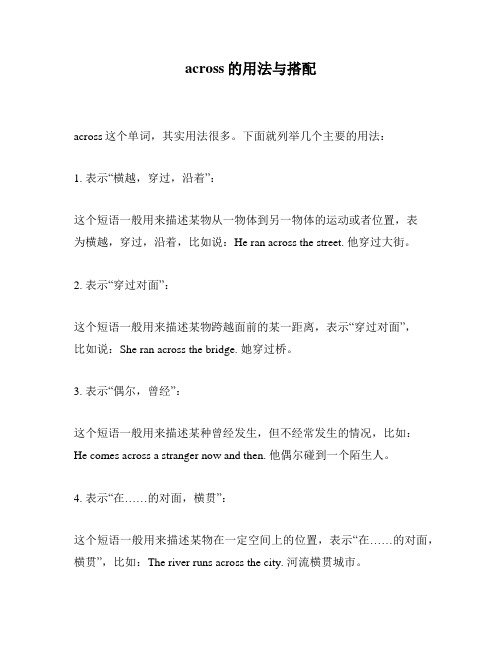
across的用法与搭配
across这个单词,其实用法很多。
下面就列举几个主要的用法:
1. 表示“横越,穿过,沿着”:
这个短语一般用来描述某物从一物体到另一物体的运动或者位置,表
为横越,穿过,沿着,比如说:He ran across the street. 他穿过大街。
2. 表示“穿过对面”:
这个短语一般用来描述某物跨越面前的某一距离,表示“穿过对面”,
比如说:She ran across the bridge. 她穿过桥。
3. 表示“偶尔,曾经”:
这个短语一般用来描述某种曾经发生,但不经常发生的情况,比如:
He comes across a stranger now and then. 他偶尔碰到一个陌生人。
4. 表示“在……的对面,横贯”:
这个短语一般用来描述某物在一定空间上的位置,表示“在……的对面,横贯”,比如:The river runs across the city. 河流横贯城市。
5. 表示“沿着,穿过”:
这个短语一般用来描述某物从空间某一范围的运动,表示“沿着,穿过”,比如:He went across the field. 他沿着田野走去。
总的来说,across 的用法甚多,掌握其用法,就可以说熟练地使用它来表达不同的意思。
across的用法

across的用法Across是一个常用的英语单词,它有多种用法。
本文将介绍across的常见用法及其相关例句,以帮助大家更好地理解和掌握这个单词。
1. 表示“横跨、穿过”例如:We walked across the bridge.(我们走过了桥。
)2. 表示“在……的另一边”例如:The store is across the street.(商店在街的对面。
) 3. 表示“在……的各个部分”例如:She spread the map across the table.(她把地图铺在桌子上。
)4. 表示“贯穿、遍及”例如:The virus spread across the world.(病毒在全球范围内传播。
)5. 表示“跨越、超越”例如:The movie is popular across all ages.(这部电影受到各个年龄段观众的喜爱。
)6. 表示“在……的对面”例如:The hotel is across from the park.(酒店在公园的对面。
)7. 表示“跨过、越过”例如:He jumped across the stream.(他跳过了小溪。
)8. 表示“从一边到另一边”例如:The ball rolled across the room.(球在房间里滚动。
) 9. 表示“在……的范围内”例如:There are many different cultures across the world.(世界各地有许多不同的文化。
)10. 表示“穿过、越过”例如:The hiker went across the mountain.(远足者穿过了山脉。
)11. 表示“在……的整个时间里”例如:The concert lasted across three hours.(音乐会持续了三个小时。
)12. 表示“在……的对岸”例如:The boat sailed across the river.(船在河的对岸航行。
- 1、下载文档前请自行甄别文档内容的完整性,平台不提供额外的编辑、内容补充、找答案等附加服务。
- 2、"仅部分预览"的文档,不可在线预览部分如存在完整性等问题,可反馈申请退款(可完整预览的文档不适用该条件!)。
- 3、如文档侵犯您的权益,请联系客服反馈,我们会尽快为您处理(人工客服工作时间:9:00-18:30)。
across的用法与易错说明
1. 用作介词或副词,注意以下用法:
(1) 表示动态意义,意为“横过”、“到……的另一边”。
如:
I cam swim across the river in 10 minutes. 我可以在十分钟之内游过河去。
(介词用法)
Can you swim across? 你能游过去吗? (副词用法)
(2) 表示静态意义,意为“在……的另一边”。
如:
My house is just across the street. 我家就在街道对面。
(介词用法)
We leave Dover at ten and we should be across in France by midnight. 我们十点钟离开多佛,午夜时应能抵达法国那边。
(副词用法)
有可与介词from 连用,表示“从……的另一边”。
如:
He shouted to me from across the room. 他从房间的另一边向我喊。
(3) 表示“交叉”(介词用法) 或“从一边到另一边的宽度”(副词用法)。
如:
He sat there with his arms across his chest. 他坐在那儿,两臂交叉放在胸前。
(介词用法)
The river is half a mile across. 这条河半英里宽。
(副词用法)
2. 不要将across 误用作动词。
如:
不能说:The river is too deep and we can’t across.
可改为:The river is too deep and we can’t cross. 河水太深,我们过不了。
3. 用于come [run] across, 意为“偶然遇见”、“意外发现”(不用于被动式)。
如:Where did you come [run] across her? 你在那儿碰到她的?
I’ve just come across a beautiful poem in this book. 我在这本书里偶然发现一首优美的诗。
